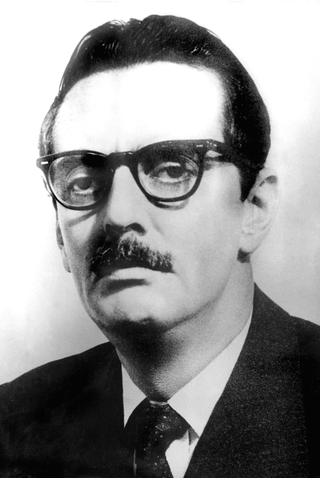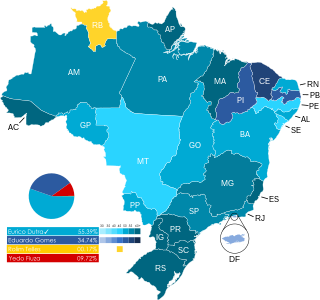| ||||||||||||||||||||||||||||||||||||||
| ||||||||||||||||||||||||||||||||||||||
 | ||||||||||||||||||||||||||||||||||||||
| ||||||||||||||||||||||||||||||||||||||
| This article is part of a series on the |
 |
|---|
Presidential elections were held in Brazil on 3 October 1955. [1] The result was a victory for Juscelino Kubitschek, who received 35.7% of the vote. Voter turnout was 59.7%. [2]
| ||||||||||||||||||||||||||||||||||||||
| ||||||||||||||||||||||||||||||||||||||
 | ||||||||||||||||||||||||||||||||||||||
| ||||||||||||||||||||||||||||||||||||||
| This article is part of a series on the |
 |
|---|
Presidential elections were held in Brazil on 3 October 1955. [1] The result was a victory for Juscelino Kubitschek, who received 35.7% of the vote. Voter turnout was 59.7%. [2]
After the suicide of Getúlio Vargas, his Vice President João Café Filho took office. Prior to Vargas' death, Brazil was living a time of intense political division, with the right-wing opposition National Democratic Union (UDN), high-level military officers and the mass media openly trying to depose him following the attempted assassination of right-wing journalist Carlos Lacerda, allegedly ordered by Vargas.
Juscelino Kubitschek, then Governor of Minas Gerais and a member of the pro-Vargas Social Democratic Party (PSD) announced his candidacy and built an alliance with the popular left-wing populist João Goulart of Vargas' Brazilian Labour Party (PTB), who was Vargas' former Minister of Labour and personal friend and who became cherished by the workers after granting a 100% increase in the minimum wage. A PSD-PTB coalition was then formed, with Kubitschek as the presidential candidate and Goulart as his running mate.
The UDN, which wanted to do a more moderate and centrist image launched the candidacy of Juarez Távora, an old military officer. The party formed a multi-party coalition in order to defeat the PSD-PTB coalition, a coalition which included the Republican Party and the Christian Democratic Party.
The Social Progressive Party (PSP) candidate was its leader, the populist former São Paulo Governor Adhemar de Barros. The PSP had supported Vargas in 1950, helping him win, but Adhemar was known to have presidential ambitions of his own.
Also on the right, Plínio Salgado of the minor Popular Representation Party (PRP) ran for president. Salgado was known for being the leader of Brazilian Integralism in the late 1930s and early 1940s. Integralismo was a far right movement described as a Brazilian branch of fascism.
During the campaign, Luís Carlos Prestes, leader of then illegal Brazilian Communist Party (PCB) recommended the tactical vote for the Kubitschek-Goulart ticket, an incident which increased the communist denunciations of the UDN and the media against the PSD-PTB campaign.
| Candidate | Party | Votes | % | |
|---|---|---|---|---|
| Juscelino Kubitschek | Social Democratic Party | 3,077,411 | 35.68 | |
| Juarez Távora | National Democratic Union | 2,610,462 | 30.27 | |
| Adhemar de Barros | Social Progressive Party | 2,222,725 | 25.77 | |
| Plínio Salgado | Popular Representation Party | 714,379 | 8.28 | |
| Total | 8,624,977 | 100.00 | ||
| Valid votes | 8,624,977 | 94.81 | ||
| Invalid/blank votes | 472,037 | 5.19 | ||
| Total votes | 9,097,014 | 100.00 | ||
| Registered voters/turnout | 15,243,246 | 59.68 | ||
| Source: Nohlen, SAP | ||||
| Candidate | Party | Votes | % | |
|---|---|---|---|---|
| João Goulart | Brazilian Labour Party–Social Democratic Party | 3,591,409 | 44.25 | |
| Milton Campos | National Democratic Union | 3,384,739 | 41.70 | |
| Danton Coelho | Social Progressive Party | 1,140,261 | 14.05 | |
| Total | 8,116,409 | 100.00 | ||
| Valid votes | 8,116,409 | 89.22 | ||
| Invalid/blank votes | 980,605 | 10.78 | ||
| Total votes | 9,097,014 | 100.00 | ||
| Registered voters/turnout | 15,243,246 | 59.68 | ||
| Source: SAP | ||||

Plínio Salgado was a Brazilian politician, writer, journalist, and theologian. He founded and led Brazilian Integralist Action, a political party inspired by the fascist regime of Benito Mussolini.

Brazilian Integralism was a political movement in Brazil, created in October 1932. Founded and led by Plínio Salgado, a literary figure somewhat famous for his participation in the 1922 Modern Art Week, the movement had adopted some characteristics of European mass movements of those times, specifically of Italian fascism, but distanced itself from Nazism because Salgado himself did not support racism. He believed that every person of every race should unite under the Integralist flag. Despite the movement's slogan "Union of all races and all peoples", members and leaders like Gustavo Barroso held anti-Semitic views. The name of the party created to support its doctrine was Brazilian Integralist Action. The reference to Integralism mirrored a traditionalist movement in Portugal, the Lusitanian Integralism. For its symbol, the AIB used a flag with a white disk on a royal blue background, with an uppercase sigma (Σ) in its center.

Jânio da Silva Quadros was a Brazilian lawyer and politician who served as the 22nd president of Brazil from January 31 to August 25, 1961, when he resigned from office. He also served as the 24th and 36th mayor of São Paulo, and the 18th governor of the state of São Paulo. Quadros was known for his populist style of government, honesty, and eccentric behavior.

The Fourth Brazilian Republic, also known as the "Populist Republic" or as the "Republic of 46", is the period of Brazilian history between 1946 and 1964. It was marked by political instability and the military's pressure on civilian politicians which ended with the 1964 Brazilian coup d'état and the establishment of the Brazilian military dictatorship.

Tancredo de Almeida Neves was a Brazilian politician, lawyer, and entrepreneur. He served as Minister of Justice and Internal Affairs from 1953 to 1954, President of the Council of Ministers from 1961 to 1962, Minister of Finance in 1962, and as Governor of Minas Gerais from 1983 to 1984. He was elected President of the Republic in 1985, but died before taking office.

The Brazilian Socialist Party is a political party in Brazil. It was founded in 1947, before being abolished by the military regime in 1965 and re-organised in 1989 after the re-democratisation of Brazil. It elected six Governors in 2010, becoming the second largest party in number of state governments, behind only PSDB. In addition to that, it won 34 seats in the Chamber of Deputies and three seats in the Senate, besides having been a member of the For Brazil to Keep on Changing coalition, which elected Dilma Rousseff as President of Brazil.

The National Democratic Union was a political party that existed in Brazil between 1945 and 1965. It was ideologically aligned with conservatism. During most of its existence, it was the country's second-strongest party. Its symbol was an Olympic torch and its motto was "The price of freedom is eternal vigilance", a quote falsely attributed to Thomas Jefferson.

Brazilian Integralist Action was an integralist/fascist political party in Brazil. It was based upon the ideology of Brazilian Integralism as developed by its leader Plínio Salgado. Brazilian Integralism supported a revival of spirituality in Brazil in the form of Brazilian nationalism to form a shared identity between Brazilians. It denounced materialism, liberalism, and Marxism. It was violently opposed to the Brazilian Communist Party and competed with the Communists for the working class vote.

The Social Democratic Party was a political party in Brazil between 1945 and 1965. It was founded by Getúlio Vargas when he transformed his Estado Novo into a multi-party system. The PSD was a centrist party which represented the more conservative wing of the Getulist movement. The other pro-Vargas party was the Brazilian Labour Party (PTB).

A constitutional referendum was held in Brazil on 6 January 1963 to determine the country's form of government. Voters were asked whether they approved of a constitutional amendment made in 1961 that transferred much of the president's power to the National Congress. The changes were rejected by the majority of voters, resulting in the choice of presidentialism, the end of the Parliamentary Republic established in 1961 and the restoration of the full powers of president João Goulart, also sworn in in 1961. The referendum's original date was April 1965, but it was brought forward.

General elections were held in Brazil on 2 December 1945, the first since the establishment of Getúlio Vargas' Estado Novo. The presidential elections were won by Eurico Gaspar Dutra of the Social Democratic Party (PSD), whilst the PSD also won a majority of seats in both the Chamber of Deputies and the Senate. Voter turnout was 83% in the presidential election, 81% in the Chamber elections and 73% in the Senate elections.

Adhemar Pereira de Barros was the mayor of São Paulo (1957–1961), and twice elected Governor of São Paulo.

General elections were held in Brazil on 3 October 1950. The presidential elections were won by Getúlio Vargas of the Brazilian Labour Party, whilst the Social Democratic Party remained the largest party in both the Chamber of Deputies and the Senate, although they lost their majority in the former. Voter turnout was 72.1% in the presidential election, 72.0% in the Chamber elections and 77.7% in the Senate elections.

The Republican Party was a political party in Brazil. The PR was founded by former president of Brazil Artur Bernardes in 1945 and operated almost solely in Minas Gerais. It succeeded the old, local republican parties in the states of Minas Gerais, São Paulo, Maranhão, Pernambuco, and Paraná. The party was shut down in 1965, when all political parties were abolished by the military dictatorship.

The Brazilian Labour Party was a populist political party in Brazil founded in 1945 by supporters of President Getúlio Vargas. It was dismantled by the Institutional Act Number Two in 1965 during the military dictatorship in Brazil.

Antônio de Barros Carvalho, better known as Barros Carvalho was a landowner and Brazilian politician. He was congressman and senator for the state of Pernambuco.

Events in the year 1956 in Brazil.

The National Labour Party was a Brazilian political party of the Fourth Republic. It came into being in 1945, when the Estado Novo of Getúlio Vargas was liberalised after the end of World War II. Ideologically, the party represented more conservative and traditionalist sections of the labour movement.

The presidency of Juscelino Kubitschek began on January 31, 1956, after he won the 1955 Brazilian presidential election, and ended on January 31, 1961, when Jânio Quadros took office.